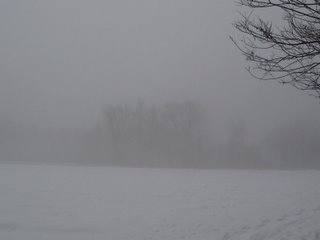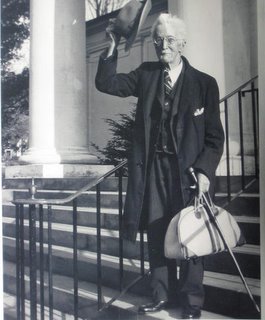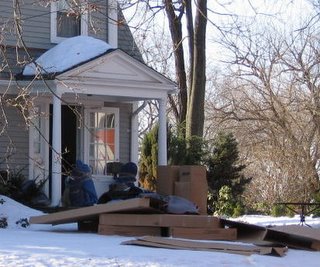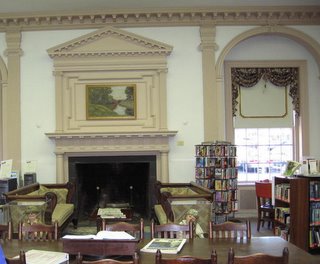Conversations with Tine on a Country Path
As Tine curled up in bed tonight, she reflected on how much more pleasant it would be to curl up with a new book from the library, instead of the dusty books strewn on the floor around the sides of her bed. But Tine's walk to the Village Library this afternoon had been unsuccessful in that regard. Tine had returned home from the library with little more to show for it than a very full mind (which isn't so bad, she thought).
So Tine crawled back out of bed and retrieved one of the books on the floor. The book was Martin Heidegger's "Discourse on Thinking" -- as it was bound to be after Tine and Rubob's walk today. Tine had focused during the walk on a chapter in the book titled "Conversations on a Country Path."
Settling snugly back in bed, with her hot water bottle from a Boots Chemist's shop beside her, Tine read:
"So the region itself is at once an expanse and an abiding. It abides into the expanse of resting. It expands into the abiding of what has freely turned toward itself."
"The part about the expanse of resting makes a lot of sense to me," Tine thought, stretching her legs on her soft, light-blue flannel sheets, the ones with the sheep on them.
"That-which-regions is an abiding expanse which, gathering all, opens itself, so that in it openness is halted and held, letting everything merge in its own resting."
"The curious thing is that this makes sense to me," Tine thought, "and I'm not absolutely sure that it should do. He's talking about the Meadows. That's exactly how I feel in the Meadows."
As Tine reflected on this, falling deeper and deeper into the expanse of resting, as it were, she thought, "I wonder why it even needed to be put in a book. It's like one of Rubob's guidebooks to 'Ulysses' in a way. The original text is often far more interesting."
"Why not just go straight to the Meadows?" Tine thought. "The words -- the ones about the openness, the gathering, the expanse -- they're all there, 'abiding' in the fields, she reflected, chuckling to herself over her use of Heidegger's word.
"The whole idea is there in the fields by the river," she thought. The Meadows are like one really big word, in a way, gathering everything else into it, or a long rambling paragraph, like in Rubob's "Ulysses." And chuckling to herself again, she thought of Rubob's word from their walk in the fields yesterday: 'phantasmagoric.'
"I suppose it's easier to follow a helpful guidebook, though, especially when the Meadows are all misted over," Tine thought.
And the curious thing is that Tine fell asleep with the identical picture in her mind as the previous night, but with a longing to revisit the scene on a brighter day.

So Tine crawled back out of bed and retrieved one of the books on the floor. The book was Martin Heidegger's "Discourse on Thinking" -- as it was bound to be after Tine and Rubob's walk today. Tine had focused during the walk on a chapter in the book titled "Conversations on a Country Path."
Settling snugly back in bed, with her hot water bottle from a Boots Chemist's shop beside her, Tine read:
"So the region itself is at once an expanse and an abiding. It abides into the expanse of resting. It expands into the abiding of what has freely turned toward itself."
"The part about the expanse of resting makes a lot of sense to me," Tine thought, stretching her legs on her soft, light-blue flannel sheets, the ones with the sheep on them.
"That-which-regions is an abiding expanse which, gathering all, opens itself, so that in it openness is halted and held, letting everything merge in its own resting."
"The curious thing is that this makes sense to me," Tine thought, "and I'm not absolutely sure that it should do. He's talking about the Meadows. That's exactly how I feel in the Meadows."
As Tine reflected on this, falling deeper and deeper into the expanse of resting, as it were, she thought, "I wonder why it even needed to be put in a book. It's like one of Rubob's guidebooks to 'Ulysses' in a way. The original text is often far more interesting."
"Why not just go straight to the Meadows?" Tine thought. "The words -- the ones about the openness, the gathering, the expanse -- they're all there, 'abiding' in the fields, she reflected, chuckling to herself over her use of Heidegger's word.
"The whole idea is there in the fields by the river," she thought. The Meadows are like one really big word, in a way, gathering everything else into it, or a long rambling paragraph, like in Rubob's "Ulysses." And chuckling to herself again, she thought of Rubob's word from their walk in the fields yesterday: 'phantasmagoric.'
"I suppose it's easier to follow a helpful guidebook, though, especially when the Meadows are all misted over," Tine thought.
And the curious thing is that Tine fell asleep with the identical picture in her mind as the previous night, but with a longing to revisit the scene on a brighter day.























